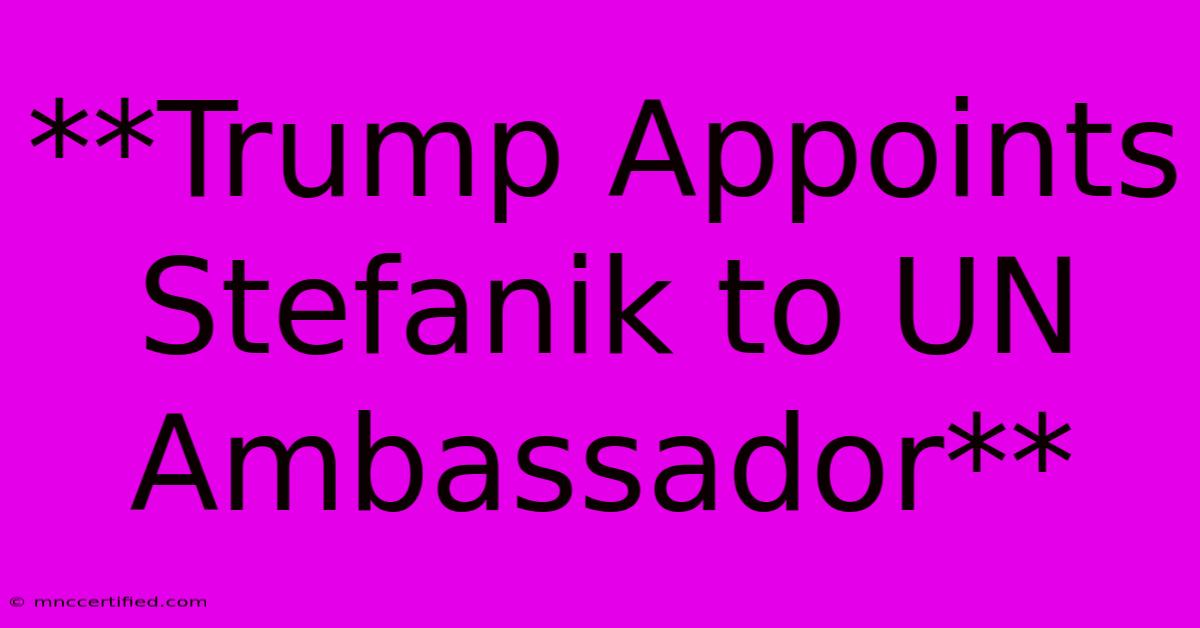**Trump Appoints Stefanik To UN Ambassador**

Table of Contents
Trump Appoints Elise Stefanik as UN Ambassador: A Controversial Choice Sparks Debate
Former President Donald Trump's decision to appoint Representative Elise Stefanik as the United States Ambassador to the United Nations has sparked considerable debate and controversy. This move, announced in July 2023, came amidst a backdrop of ongoing political polarization and concerns over Stefanik's qualifications and past statements.
Stefanik's Background and Political Trajectory
Elise Stefanik, a Republican from New York, rose to prominence within the Republican Party after her election to the House of Representatives in 2014. She quickly became a vocal supporter of former President Trump and a prominent figure in the GOP's conservative wing.
The Appointment's Context: Trump's Legacy and the Republican Party's Shift
The appointment comes at a time when the Republican Party is grappling with the legacy of former President Trump. Stefanik, who ascended to the role of Republican Conference Chair in 2021, has been a key figure in shaping the party's direction since Trump's departure. Critics argue that her appointment reflects a further shift towards a more extreme right-wing agenda within the GOP.
Concerns over Stefanik's Qualifications and Past Statements
Stefanik's appointment has drawn criticism from both Democrats and some Republicans who question her qualifications for the role. Notably, she lacks significant foreign policy experience, and her past statements, including support for unsubstantiated claims of election fraud, have raised concerns about her suitability for representing the United States on the global stage.
The Role of the UN Ambassador and Potential Implications
The United States Ambassador to the United Nations is a crucial position responsible for representing the country's interests within the organization. The ambassador plays a key role in shaping international diplomacy, advocating for US policies, and building relationships with other nations.
What's Next: Confirmation Process and Future Challenges
The appointment of Elise Stefanik as UN Ambassador is subject to Senate confirmation. The confirmation process is likely to be contentious, with Democrats expressing strong opposition and Republicans divided in their support. The future of this appointment hinges on the outcome of this process and the potential for further political debate.
Key Takeaways:
- The appointment of Elise Stefanik as UN Ambassador is a significant move with potentially lasting implications for US foreign policy.
- Her lack of foreign policy experience and past statements raise concerns about her qualifications for the role.
- The appointment reflects the ongoing political polarization in the United States and the Republican Party's shift towards a more conservative ideology.
- The Senate confirmation process is likely to be contentious, and the outcome will determine Stefanik's future as UN Ambassador.
Further Research:
- Elise Stefanik's Biography: Research Stefanik's political career, her legislative record, and her voting history to understand her past positions and potential future actions.
- The Role of the UN Ambassador: Explore the responsibilities and importance of the UN Ambassador position within the context of US foreign policy.
- US-UN Relations: Examine the current state of US-UN relations and the challenges facing the United States in navigating international diplomacy.
- Political Polarization: Analyze the extent and impact of political polarization in the United States, especially within the context of the Republican Party.
This article provides a starting point for understanding the controversy surrounding Elise Stefanik's appointment as UN Ambassador. By researching further and engaging in critical analysis, you can develop a more informed perspective on this significant political event.

Thank you for visiting our website wich cover about **Trump Appoints Stefanik To UN Ambassador**. We hope the information provided has been useful to you. Feel free to contact us if you have any questions or need further assistance. See you next time and dont miss to bookmark.
Featured Posts
-
Weathered Flag Shared Patriotism California Story
Nov 12, 2024
-
Yamal Injury Latest News And Recovery
Nov 12, 2024
-
Megan Fox And Mgk Welcome Baby No 4
Nov 12, 2024
-
Red Carpet Glamour Mtv Emas 2024 Arrivals
Nov 12, 2024
-
Green Bitcoin Price Prediction 2025
Nov 12, 2024